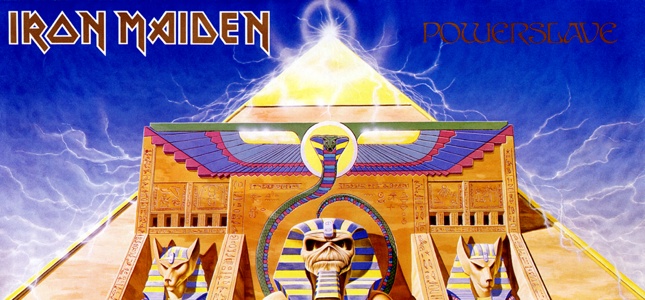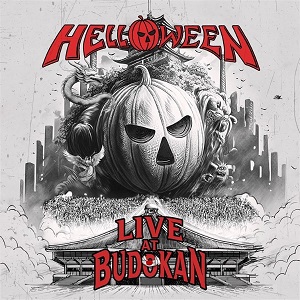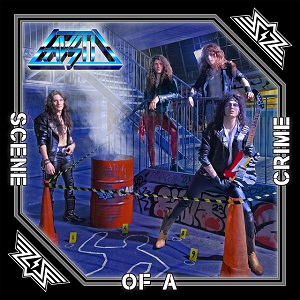IRON MAIDEN – Powerslave’s 30th Birthday: “I Don’t Know How I Did It, Because I Felt At Death’s Door”
September 3, 2014, 10 years ago

This glories day in metal, September 3rd, 2014, marks the power-packed 30th anniversary of Iron Maiden’s immense classic Powerslave, the band’s fifth album, and, arguably, their second to utilize the signature Maiden sound.
And yet... Powerslave feels like unfinished business. After the syncopated synergistic totality of Peace Of Mind, Maiden were on a merry metal roll, drunk, punked and randy. And in the heat of one of metal’s biggest years, 1984, they would deliver their cusp album, a somewhat ragged, wayward affair that was a kitchen sink catch-all, fortunately from a band who could do no wrong.
The album was recorded at the infamous Compass Point Studios in Nassau in the Bahamas, one of those “get away from it all” locales that AC/DC found uncomfortable, but the more outgoing Maiden found just fine.

Adrian Smith—as we visit the BraveWord archive to bring you this piece—offers a bit of mood lighting. “We were pretty well-behaved actually. It was a fantastic environment, in some ways, to work. It was beautiful. We had apartments right on the sea. The studio was right there. It was very isolated. Every now and again we would get what we would call island fever and we all had to go into Nassau and party for a couple of days. But we did manage to get quite a bit of work done amongst all the fun. Not much arguing about anything. I think that might have come a little bit later (laughs). I think at the time we were kind of riding a wave and having a great time and flying high.”
Further illuminating the surreal quality of the working environment, Smith recounts the following tale. “I’ll tell you a great story about Powerslave. We were in the Bahamas, this is actually about the track ‘Powerslave’, and like I say, we used to party a lot. I had been in the studio with Martin Birch and the engineer and we had finished the night before and we’d been working quite hard so we decided to have a little bit of relaxation if you know what I mean. Anyway, about five o’clock in the morning we were all kind of staggering around and I said, ‘Look man, I’ve got to go to bed.’ So I left, fully expecting to have the day off the next day. And then the phone rang at about two o’clock in the afternoon as it was Martin. He was the last person who I expected to hear from. And he was slurring, ‘Come down to the studio and let’s do some work.” And I thought, ‘Oh my God, no.’ So I went down to the studio and apparently he had been up drinking with Robert Palmer all night, because he lived next door to the studio. So Robert Palmer is sitting there in his dressing gown, and they were both drinking tequila and they wanted me to work and I was completely hung-over and I felt like death and I was totally intimidated because Robert Palmer was there, a big name guy, and I plugged my guitar in and I think I did the solo in ‘Powerslave’ on my first take. I don’t know how I did it, because I felt at death’s door. And Robert Palmer was jumping up and down and really getting off on the track. It was bizarre. And then after that I went home and slept for a couple of days.”
The record opens with “Aces High,” a barnstormer perhaps only one brick short of a full load (but now with an extra mixed metaphor!), evidenced by a nice enough intro that pointlessly dissolves into an unrelated verse, perhaps the first clue that this record will be less brilliantly conceived versus Piece Of Mind, yet somehow more in the lively metal spirit of things. Adrian says that this track set the tone for Powerslave’s intensity of productivity. “The first time we played that was in Jersey, where we used to rehearse, in the Channel Islands. It’s a typical Iron Maiden song, one of Steve’s better songs I think. It’s really exciting and up-tempo. It was like, ‘Yeah, if this is how this album is going, this is going to be a great album.’”

Was this album more work than Piece Of Mind? “Sort of the same. We had a process set up. We would go to Jersey and rehearse for a month or six weeks and then go to the Bahamas for a couple of months and then go mix it. It was about the same, three months.”
Track two, “2 Minutes To Midnight,” is the album’s masterpiece. Adrian explains: “Well, that’s basically a hard rock tune. People know me and that’s what my thing is in the band, and it runs through to what I did with Psycho Motel. I’m guitar-oriented. That’s where my writing goes. I was one of the first of us to get a little four-track, a multi-track sort of recorder and I was sitting in my hotel room in a Jersey working on this riff and there was a banging on the door, and it was Bruce, because we had taken over the whole hotel to rehearse, and he’s banging on my door and saying, ‘Wow, what’s that riff?’ So I played him the music to it and he had a bunch of lyrics and he started singing and we had ‘2 Minutes To Midnight.’ We wrote it in about 20 minutes (laughs).” Whatever its germination, it wins the day for Maiden by being “rock ‘n’ rollsy,” fresh, riffy, something that is inherent in Adrian’s playing more so than Dave’s. It steps outside the half dozen rules to which Maiden is becoming increasingly tethered by this point. It is mature, dangerous, groovy and lyrically intelligent.
“Losfer Words (Big ‘Orra)” is a pointless instrumental wank, further unraveling the record. But this is followed by “Flash Of The Blade,” a slightly above average track, blessed with a killer intro riff. “Yeah, that was a good little song,” recalls Adrian, “one of Bruce’s; good, tight little song. We never played it live but I enjoyed playing it in the studio. I actually added quite a few more guitar lines to it. A lot of the harmony stuff you hear, I actually overdubbed. Good little song. And everybody knows Bruce is a fencing nut.”When you did your famous harmony solos, how did you guys work it out? “We actually used to work separately. Dave would go in for a couple of days and do some solos, do some guitar lines and then I would go in and do my solos and put the harmony to what he’d done. And if it was Steve’s song, Steve would be there, but both of us were in there, just making sure it’s what he wanted. He’s very meticulous about his stuff, you know. But on ‘Flash Of The Blade’ for example, there were certain parts I didn’t feel were strong enough, so I overdubbed harmonies myself on top of what was already there. So occasionally we would do separate harmonies, but mostly we would do them together.”
Steve’s “The Duellists” closes side one (of the vinyl), a bit of a Piece Of Mind rehash (“Where Eagles Dare” to be specific), further evidence that quite possibly the Iron Maiden well of creativity is becoming a bit parched. Adrian however is quite pleased with his guitar solo in that one.

Side two has its own problems, but puts on a brave face, starting with “Back In The Village,” a boisterous round-up propelled by a complex and fluid riff, along with great vocal phrasings from Bruce. “That was a riff I had been playing all through the previous tour at sound checks,” explains Adrian, “and people kept saying, you’ve got to do something with that riff. So again, Bruce and I got together and we came up with the idea, ‘Back In The Village.’ He’s a real fan of that old British TV show The Prisoner and I think the lyrics are all involved with that. I think it’s a song we also did in The Untouchables (ed. one of Adrian’s fun bands during his ‘90s hiatus) and I actually sang it, believe it or not (laughs).”
“Powerslave” is possibly the album’s second most convincing track. It triggers the Egyptian musical theme carried over to the cover art, essentially announcing that two-thirds of side two will contain these Jimmy Page/Ritchie Blackmore tones. But the reason this possibly cheesy move works is because of the chorus, a beautiful composition in itself, building to an apex before nomads on camels invade for another verse.Closing the album is possibly Maiden’s most notorious and self-indulgent epic, “Rime Of The Ancient Mariner.” But because it is still a somewhat fresh idea within the Maiden camp, it works, and it lives on as a classic. “It was definitely a lot of work,” explains Adrian. “Steve walked into the studio and said, ‘I’ve got this song’ and he held the lyrics up and sort of let the paper go and it came down to the floor, you know what I mean? And so Bruce was doing the guide vocal when we were rehearsing it, and we had to get something to pin the lyrics to so we could read them. And we found this huge stepladder and pinned the lyrics to the top of the ladder so they could hang down and you could see all the verses. We used to call it pyramid power.”
The song is perhaps in need of a bit of an edit, but only a bit. Somehow the energy is maintained, most likely due to its complex, traveling yet catchy riff. It is also inspiring how the song does not begin with one of Steve’s dreary intros. We are into the thick of the action immediately. But Steve gets us back later, dredging the melancholy feel of those sailors parched and dying without a drop to drink. I think the last thing they want to hear is a bass solo from Steve.

In the harsh light of 30 additional years of Maiden history since the birthing of this huge record, Maiden have found themselves in the fortunate situation where camps are interestingly divided with respect to what their favourite Maiden albums are. Powerslave and the two before it are often mentioned, as is, oddly enough, Seventh Son Of A Seven Son. Whatever the preference, Powerslave is a type of lightning rod, like I say, the cusp record, a point where the sands of time shift between the old, succinct Maiden and a band with many more progressive elements. It is an unhinged record of many motivations, for that reason always an interesting scrap yard to visit, the listener always energized, metally and mentally challenged upon exit. Adrian senses the shift as well. “I always find Piece Of Mind very, very dry. There are some great songs, but it’s a bit hard to listen to now. Powerslave is a little bit smoother, I think. It was on the way to where we were going with Somewhere In Time.”
Martin Popoff’s coffee table-booked styled 2 Minutes To Midnight: An Iron Maiden Day-by-Day is out now at Martinpopoff.com.
(All classic Iron Maiden photos courtesy of the Martin Popoff Archive)











